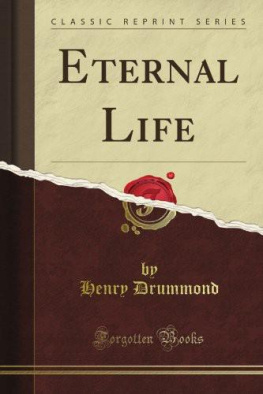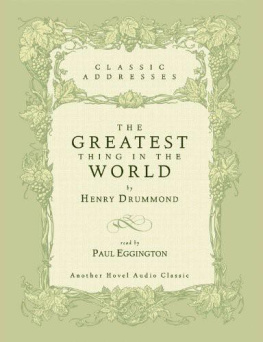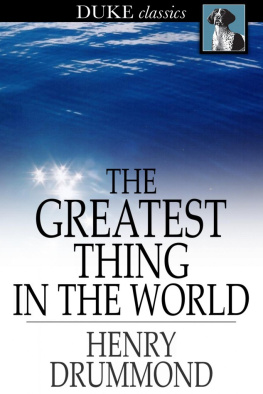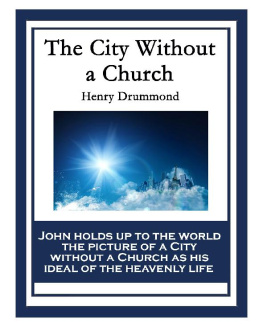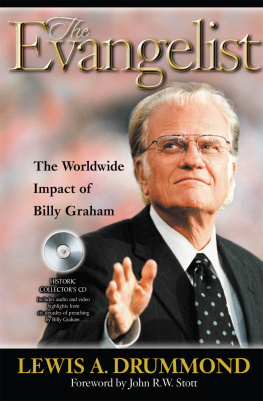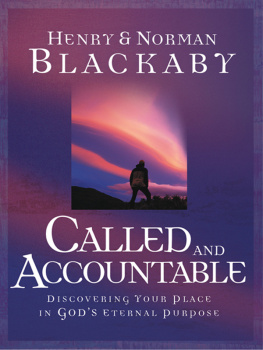Henry Drummond - Eternal life
Here you can read online Henry Drummond - Eternal life full text of the book (entire story) in english for free. Download pdf and epub, get meaning, cover and reviews about this ebook. City: Philadelphia, year: 1896, publisher: H. Altemus, genre: Religion. Description of the work, (preface) as well as reviews are available. Best literature library LitArk.com created for fans of good reading and offers a wide selection of genres:
Romance novel
Science fiction
Adventure
Detective
Science
History
Home and family
Prose
Art
Politics
Computer
Non-fiction
Religion
Business
Children
Humor
Choose a favorite category and find really read worthwhile books. Enjoy immersion in the world of imagination, feel the emotions of the characters or learn something new for yourself, make an fascinating discovery.
- Book:Eternal life
- Author:
- Publisher:H. Altemus
- Genre:
- Year:1896
- City:Philadelphia
- Rating:4 / 5
- Favourites:Add to favourites
- Your mark:
- 80
- 1
- 2
- 3
- 4
- 5
Eternal life: summary, description and annotation
We offer to read an annotation, description, summary or preface (depends on what the author of the book "Eternal life" wrote himself). If you haven't found the necessary information about the book — write in the comments, we will try to find it.
Eternal life — read online for free the complete book (whole text) full work
Below is the text of the book, divided by pages. System saving the place of the last page read, allows you to conveniently read the book "Eternal life" online for free, without having to search again every time where you left off. Put a bookmark, and you can go to the page where you finished reading at any time.
Font size:
Interval:
Bookmark:

Eternal Life, by Henry Drummond
The Project Gutenberg EBook of Eternal Life, by Henry Drummond This eBook is for the use of anyone anywhere at no cost and with almost no restrictions whatsoever. You may copy it, give it away or re-use it under the terms of the Project Gutenberg License included with this eBook or online at www.gutenberg.net
Title: Eternal Life
Author: Henry Drummond
Release Date: January 6, 2010 [EBook #30876]
Language: English
Character set encoding: ISO-8859-1
*** START OF THIS PROJECT GUTENBERG EBOOK ETERNAL LIFE ***
Produced by Michael Gray
Eternal Life
By Professor Henry Drummond
Philadelphia Henry Altemus
Copyright 1896 by Henry Altemus.
ETERNAL LIFE.
"This is Life Eternal--that they might know Thee, the True God, and Jesus Christ whom Thou has sent."-- Jesus Christ .
"Perfect correspondence would be perfect life. Were there no changes in the environment but such as the organism had adapted changes to meet, and were it never to fail in the efficiency with which it met them, there would be eternal existence and eternal knowledge."-- Herbert Spencer .
ONE of the most startling achievements of recent science is a definition of Eternal Life. To the religious mind this is a contribution of immense moment. For eighteen hundred years only one definition of Life Eternal was before the world. Now there are two.
Through all these centuries revealed religion had this doctrine to itself. Ethics had a voice, as well as Christianity, on the question of the summum bonum ; Philosophy ventured to speculate on the Being of a God. But no source outside Christianity contributed anything to the doctrine of Eternal Life. Apart from Revelation, this great truth was unguaranteed. It was the one thing in the Christian system that most needed verification from without, yet none was forthcoming. And never has any further light been thrown upon the question why in its very nature the Christian Life should be Eternal. Christianity itself even upon this point has been obscure. Its decision upon the bare fact is authoritative and specific. But as to what there is in the Spiritual Life necessarily endowing it with the element of Eternity, the maturest theology is all but silent.
It has been reserved for modern biology at once to defend and illuminate this central truth of the Christian faith. And hence in the interests of religion, practical and evidential, this second and scientific definition of Eternal Life is to be hailed as an announcement of commanding interest. Why it should not yet have received the recognition of religious thinkers--for already it has lain some years unnoticed--is not difficult to understand. The belief in Science as an aid to faith is not yet ripe enough to warrant men in searching there for witnesses to the highest Christian truths. The inspiration of Nature, it is thought, extends to the humbler doctrines alone. And yet the reverent inquirer who guides his steps in the right direction may find even now in the still dim twilight of the scientific world much that will illuminate and intensify his sublimest faith. Here, at least, comes, and comes unbidden, the opportunity of testing the most vital point of the Christian system. Hitherto the Christian philosopher has remained content with the scientific evidence against Annihilation. Or, with Butler, he has reasoned from the Metamorphoses of Insects to a future life. Or again, with the authors of "The Unseen Universe," the apologist has constructed elaborate, and certainly impressive, arguments upon the Law of Continuity. But now we may draw nearer. For the first time Science touches Christianity positively on the doctrine of Immortality. It confronts us with an actual definition of an Eternal Life, based on a full and rigidly accurate examination of the necessary conditions. Science does not pretend that it can fulfil these conditions. Its votaries make no claim to possess the Eternal Life. It simply postulates the requisite conditions without concerning itself whether any organism should ever appear, or does now exist, which might fulfil them. The claim of religion, on the other hand, is that there are organisms which possess Eternal Life. And the problem for us to solve is this: Do those who profess to possess Eternal Life fulfil the conditions required by Science, or are they different conditions? In a word, Is the Christian conception of Eternal Life scientific?
It may be unnecessary to notice at the outset that the definition of Eternal Life drawn up by Science was framed without reference to religion. It must indeed have been the last thought with the thinker to whom we chiefly owe it, that in unfolding the conception of a Life in its very nature necessarily eternal, he was contributing to Theology.
Mr. Herbert Spencer--for it is to him we owe it--would be the first to admit the impartiality of his definition; and from the connection in which it occurs in his writings, it is obvious that religion was not even present to his mind. He is analyzing with minute care the relations between Environment and Life. He unfolds the principle according to which Life is high or low, long or short. He shows why organisms live and why they die. And finally he defines a condition of things in which an organism would never die--in which it would enjoy a perpetual and perfect Life. This to him is, of course, but a speculation. Life Eternal is a biological conceit. The conditions necessary to an Eternal Life do not exist in the natural world. So that the definition is altogether impartial and independent. A Perfect Life, to Science, is simply a thing which is theoretically possible--like a Perfect Vacuum.
Before giving, in so many words, the definition of Mr. Herbert Spencer, it will render it fully intelligible if we gradually lead up to it by a brief rehearsal of the few and simple biological facts on which it is based. In considering the subject of Death, we have formerly seen that there are degrees of Life. By this is meant that some lives have more and fuller correspondence with Environment than others. The amount of correspondence, again, is determined by the greater or less complexity of the organism. Thus a simple organism like the Amoeba is possessed of very few correspondences. It is a mere sac of transparent structureless jelly for which organization has done almost nothing, and hence it can only communicate with the smallest possible area of Environment. An insect, in virtue of its more complex structure, corresponds with a wider area. Nature has endowed it with special faculties for reaching out to the Environment on many sides; it has more life than the Amoeba. In other words, it is a higher animal. Man again, whose body is still further differentiated, or broken up into different correspondences, finds himself en rapport with his surroundings to a further extent. And therefore he is higher still, more living still. And this law, that the degree of Life varies with the degree of correspondence, holds to the minutest detail throughout the entire range of living things. Life becomes fuller and fuller, richer and richer, more and more sensitive and responsive to an ever-widening Environment as we rise in the chain of being.
Now it will speedily appear that a distinct relation exists, and must exist, between complexity and longevity. Death being brought about by the failure of an organism to adjust itself to some change in the Environment, it follows that those organisms which are able to adjust themselves most readily and successfully will live the longest. They will continue time after time to effect the appropriate adjustment, and their power of doing so will be exactly proportionate to their complexity--that is, to the amount of Environment they can control with their correspondences. There are, for example, in the Environment of every animal certain things which are directly or indirectly dangerous to Life. If its equipment of correspondences is not complete enough to enable it to avoid these dangers in all possible circumstances, it must sooner or later succumb. The organism then with the most perfect set of correspondences, that is, the highest and most complex organism, has an obvious advantage over less complex forms. It can adjust itself more perfectly and frequently. But this is just the biological way of saying that it can live the longest. And hence the relation between complexity and longevity may be expressed thus--the most complex organisms are the longest lived.
Next pageFont size:
Interval:
Bookmark:
Similar books «Eternal life»
Look at similar books to Eternal life. We have selected literature similar in name and meaning in the hope of providing readers with more options to find new, interesting, not yet read works.
Discussion, reviews of the book Eternal life and just readers' own opinions. Leave your comments, write what you think about the work, its meaning or the main characters. Specify what exactly you liked and what you didn't like, and why you think so.

